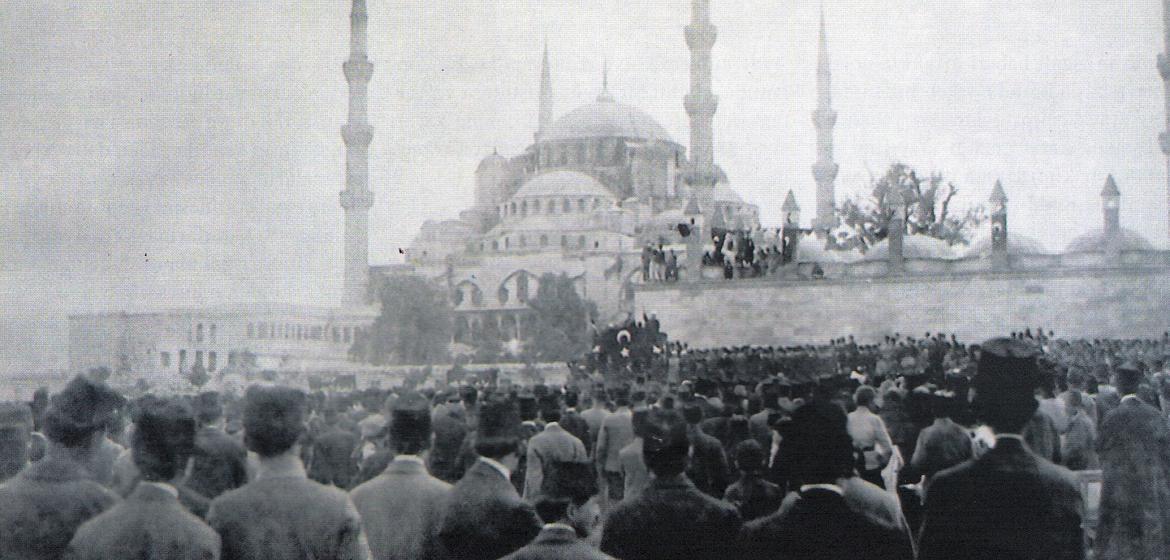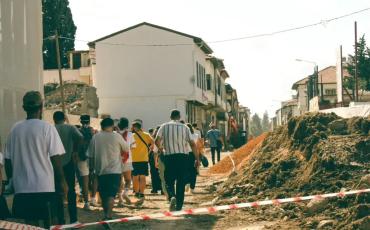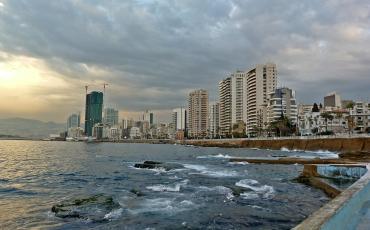With two suicide attacks in the last two months in Ankara, Turkey is falling into more instability. Yet, in the face of danger coming from Kurdish militants, the Turkish government feels left alone by the West in its anti-terrorism measures. This could prompt Ankara to take high-risk steps to ensure its own security. By Timur Akhmetov
A few weeks back, on February 18, the Turkish capital Ankara was staggered by a suicide attack again. According to the official reports from Turkish General Staff, a “terrorist” targeted a service bus transporting off-duty military personnel, which resulted in 28 people dead and 61 wounded. In response, Prime Minister Ahmet Davutoglu was quick to blame the Democratic Union Party for the violence (kurd. PYD), which represents Syrian Kurds.
The recent attacks are yet another episode in the ongoing spiral of violence rocking the country. With geopolitical instability in the region, Syria and Iraq being on the verge of collapse and seemingly unending clashes between the Workers’ Party of Kurdistan (kurd. PKK) and the Turkish government, similar attacks on Turkish soil are likely to happen again. Experts share this pessimism over the deteriorating security in the country.
The national government underlined on multiple occasions that Turkey is facing a double threat coming from PKK-separatists and Islamists from the “Islamic State” (IS). Yet, notwithstanding the fact that the suicide attacks carried out by IS and/or its sympathizers claim the biggest share of victims, Ankara avoids any direct engagement with the terrorist organization. Its reaction so far was limited to bombardments of insignificant positions of IS in Syria. Moreover, while Turkish police-forces periodically report on the arrests of people (allegedly) affiliated with IS, they do nothing to actually prevent their operations, such as political assassinations.
In its fight against Kurdish separatists, the Turkish government presents a completely different picture. On the battlefields, the PYD presented itself as a trustworthy partner of the international anti-IS coalition. In the same time, experts and political leaders were praising its efforts to contribute to social and political stability in northern Syria. Ankara is disturbed by such military and diplomatic successes of the PKK-affiliated PYD. Now that the world community is increasingly paying attention to the problems of Syrian Kurds, the government remains anxious that Turkey’s problems with its own Kurds would gain publicity and thus attract further criticism.
Turkey’s security dilemma and Rojava
From now on, stability inside Turkey is defined by the developments in Syria. Ankara’s reaction exposes deep concerns over its ability to keep the PKK further at bay. The Turkish government went on to incite new clashes with the urban military wing of the PKK in the eastern provinces. Turkey is even considering an invasion of its war torn neighbor Syria to prevent any further advancement by the Kurds from there. In addition, to forestall PYD’s territorial consolidation into a region called Rojava (kurd. for Western Kurdistan), Turkey tries to make its American partners cut all existing ties with the Syrian Kurds.
The Turkish President Recep Erdogan expressed his discontent over the close cooperation between Washington and the PYD and even suggested that the US could lose one of its partners in the Middle East unless it abandoned the policy of supporting the PYD-led Rojava region in northern Syria. Ankara seems ready to undertake serious measures to prevent the formation of any political entity on its borders that enjoys close ties to the PKK. In its response to the recent meeting of high-ranking US diplomats with PYD’s representatives, the Turkish Foreign Ministry summoned the American Ambassador John Bass to a meeting. Observers thus agree that Turkish-American relations are strained over the Syrian issue despite US efforts to mitigate disagreements.
The Turkey–Kurds–US triangle
The reason behind the souring of relations lies in Turkish fears of a Kurdish polity on its borders that would de-jure be autonomous and de-facto independent. The emergence of Iraqi Kurdistan during the Gulf war in 1991 was a historical precedent that the Turkish government seeks to avoid happening again: As such, Erdogan recently claimed that the decision of the Turkish Parliament from 2003 not to participate in the occupation of Iraq was a mistake. Had Turkey sent forces back then, it could have prevented Washington from further supporting Iraqi Kurdistan which is now formally a part of the federal Iraq.
The emergence of an independent Kurdish state in post-Saddam Iraq could lead to substantial changes inside Turkey itself. PKK fighters, taking advantage of the mountainous landscape of the border with Iraq, could attack Turkish security forces and retreat into the safe heavens of the Qandil Mountains. Already now, Turkey is witnessing its biggest nightmare coming true. To prevent the advancement of the PKK in the region, the Turkish government is forced to nourish cooperative ties with existing political parties in Iraqi Kurdistan.
Ankara’s gradual recognition of Iraqi Kurdistan was possible thanks to American guarantees that Erbil, the capital of the autonomous region, will not demand full independence from Baghdad. Clearly, Turkey has so far believed in America’s ability to control political forces in Iraq and Kurdistan and to thereby limit the Kurds’ ambitions. Thus, despite the deteriorating US-Turkish relations and the ensuing uncertainty about the region’s future, the Turkish government still expects the US to control Kurds in Syria as it does in Iraq. Turkey not only realizes that the political situation on the ground in Syria is increasingly affecting its own domestic security but also that its actions against the PKK are limited. That is why Ankara is so persistent in demanding assurances from the US that there will not be an independent Kurdish state in Syria.
What Turkey fails to understand in all this, however, is that the ongoing cooperation between Washington and Syrian Kurds is based on their coinciding interests, not on long term considerations. Both sides will inevitably clash over the question of the unification of Kurdish areas in Turkey, Syria, Iraq and Iran. Moreover, Kurds are not pleased with the fact that US military assistance in the fight against Islamists from al-Nusra and IS is not accompanied with diplomatic support with regards to Kurdish aspirations to autonomy. Kurds under PYD leadership therefore seek to diversify their relations with major stake holders in the region, like Russia, to get away from dependence on the US.
The Occidentalism in today’s Turkey
Ankara’s trust in the US seems to be rooted in the almost mythological notion that no political actors can act without the idea of a collective West, the generalized Occident, if you will. According to wide segments of Turkish society, all recent political happenings in the Middle East - such as the uprisings across the Arab region in 2011, the deposal of Egyptian presidents Mubarak and Mursi, the Gezi protests in Istanbul in 2013, the emergence of IS and PYD - happened with direct participation of the West.
Both the ignorance of the existing cobweb of interdependent political players in the Middle East and the desire to see hidden Western designs in everything that is happening in the region are to a great extent rooted in the legacy of Turkey's history. It goes back to the Ottoman Empire, the predecessor of the Turkish republic, which found itself occupied by the Entente States at the end of the First World War. The imperial government was forced to sign the ill-fated Sèvres Peace Accord in 1920 which envisaged all Ottoman colonies to be put under direct control of France and England while the core territories of Anatolia were to be occupied by the European expeditionary forces. Through victories on the battlefields during the War of Independence (1919-1923), the government of the newly proclaimed Turkish Republic was able to review the provisions of the treaty which eventually was transformed into the more acceptable Lausanne Peace Treaty of 1923.
Even though strongman Mustafa Kemal Ataturk was rapidly working towards a transformation of the new republic to make it become a part of the civilized (read: European) world, mistrust towards the West and paranoid obsessions about Western conspiratorial plans to divide the country remained firmly entrenched in the public mind.
The so-called Mosul Question made the new Turkish government realize for the first time that Western countries were not interested in compromising with regard to Turkey's vital interests and their own's. In 1924, upon a decision of the Council of the League of Nations, Turkey was forced to acknowledge the oil-rich territory around the city of Mosul, a former province of the Ottoman Empire, to be a part of the Iraqi state. Yet, this decision was pushed through by Britain which, back then, administered Iraq. The next blow to Turkey’s trust into Western sincerity was inflicted by the Cyprus Crisis in the 1960 and 70s, when the US rejected Turkish proposals to stabilize the situation on the island. Against this backdrop, Ankara’s decision to invade Cyprus in 1974 was dictated by the strong attempt to prevent further intercommunal clashes and specifically attacks on the Turkish residents of the island.
Implication for the near-term future
Seen in this historical light, the “Sèvres Syndrome” today can be described as an established opinion among broad segments of the Turkish society about the West as the only political power that exerts control in the Middle East. As such, Western states are conceived as a single actor who aims to further divide Turkey - in particular by establishing an independent Kurdistan.
That Turkey is still in the grip of the “Sèvres Syndrome” is indicated, for example, by reactions of the political elite on the current state of affairs in Northern Syria. Both the long-lasting war there as well as the rapid expansion of the Syrian Kurds is represented as a direct result of Western interventions. In effect, Turkey is getting ever more frustrated about the fruitlessness of its efforts to defend its own interests and continues to worry that Kurdish expansion in Syria may, eventually, result in the loss of the Turkish territory.
Thus, this feeling of isolation coupled with the prevalent “Sèvres Syndrome” can in the long run push Turkey into pursuing more hazardous policies in Northern Syria. In turn, this may lead to the direct clash with Russian interests and prompt a wider conflict between major stake-holders in the Syrian civil war.
Der Blog Alsharq ist ein Projekt von Ehrenamtlichen. Wenn Du unabhängigen Journalismus zum Nahen Osten nachhaltig fördern willst, werde Fördermitglied von Alsharq e.V.






















